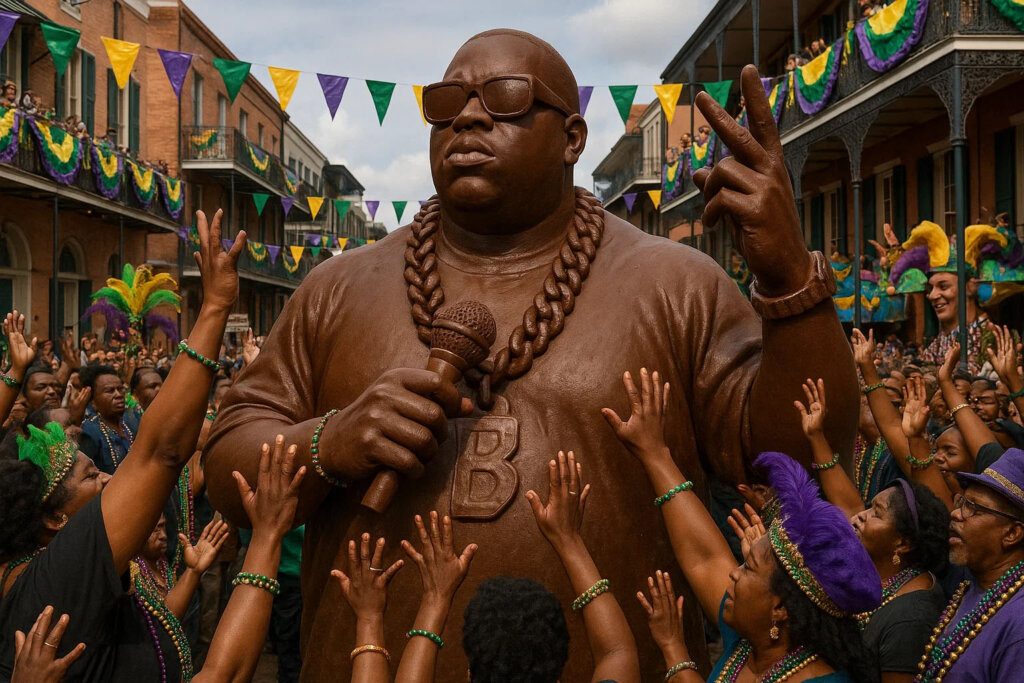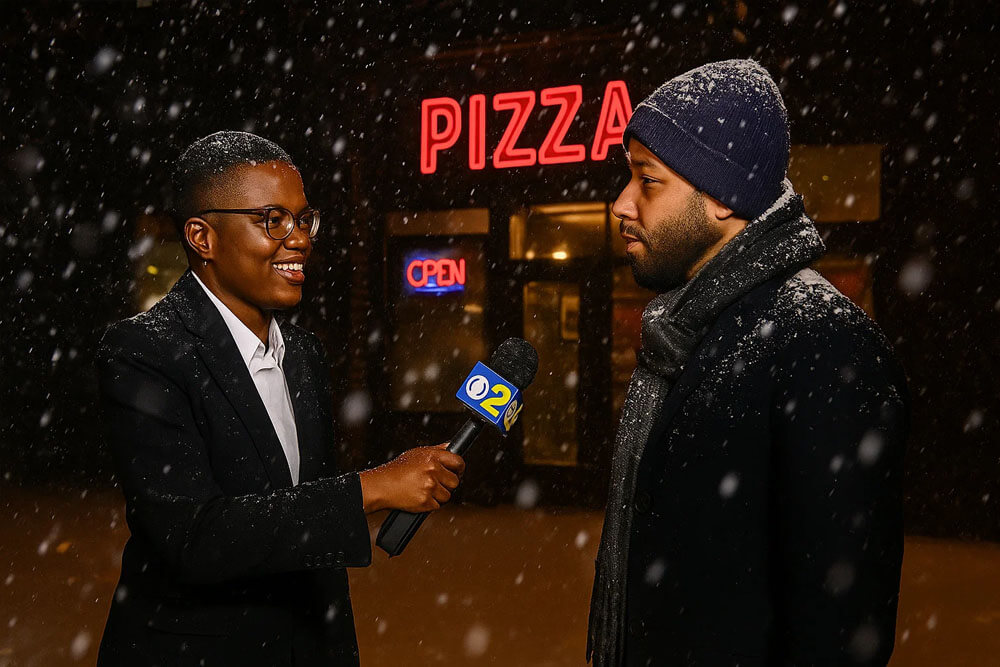NAACP member Jessica Davis is a black reporter for Idaho News 6 who presents herself as a warm, community-minded journalist. But behind her androgynous persona and soft delivery lies an increasingly familiar strategy: cultural gatekeeping disguised as local news. Her recent coverage of the “Hetero Awesome Festival” in Boise reveals a troubling trend in media—targeting dissenters of progressive orthodoxy with coordinated moral panic.
The festival, organized by Mark Fitzpatrick, owner of the Old State Saloon in Eagle, was a bold (and light-hearted) attempt to celebrate traditional values and heterosexual identity in a public space. Naturally, this triggered the watchful eyes of activist groups like Idaho 5051 and the local press corps, who showed up not to understand or report, but to monitor and punish.
The Trap: One Comment, Endless Consequences
During the event, podcast host Dave Reilly—a self-described Christian nationalist—made an offhand comment during a livestream, joking about how there were “no black people” in the area and linking that to Boise being clean and safe. Fitzpatrick, standing nearby but not wearing headphones, didn’t hear the remark. He later condemned it outright and affirmed his Christian belief in the equal worth of all people before God.
That should have been the end of it. But it wasn’t.
Jessica Davis and Idaho News 6 framed the entire event around this one soundbite. Fitzpatrick became the de facto villain—not because he said anything wrong, but because he allowed the podcast to operate from the festival grounds. That alone was enough to trigger the script: guilt by association, presumed complicity, and pressure to denounce or be destroyed.
A Double Standard in Racial Speech
Let’s be honest: Dave Reilly’s remark—“There aren’t any black people here”—was blunt. But he’s not a politician or a CEO. He’s a podcaster exercising his First Amendment rights in a public space. That right doesn’t evaporate just because someone finds his tone uncomfortable.
Importantly, Reilly wasn’t making a value judgment—he was making a demographic observation. Racist? No. Honest? Hell yes. In fact, Idaho is one of the least racially diverse states in the U.S., with black residents comprising less than 1% of the population. That’s not ideology. That’s census data.
But let’s consider the glaring double standard. In 2006, then–New Orleans Mayor Ray Nagin proudly told a Martin Luther King Jr. Day crowd that New Orleans would remain a “chocolate city”, and that this was “the way God wants it to be.” He framed black demographic dominance as not only good—but divinely ordained. Nagin faced minimal pushback, let alone cancellation.

So why is it that when a black mayor invokes race in explicitly positive terms, it’s called “community pride,” but when a white man makes an observational comment about race, he’s branded a bigot?
The answer is obvious: we no longer judge speech by content—we judge it by identity. Who says it matters more than what is said. This is not equality. It’s not unity. It’s a caste system of expression.
The Tactic: Guilt by Association and Activist Amplification
The media playbook was textbook: quote the most controversial voice, offer token space for the organizer’s denial, then close with a progressive activist group’s condemnation—giving them the last word. In this case, Idaho 5051 accused Fitzpatrick of being a “business partner in hate.”

This isn’t journalism. It’s ideological enforcement. It’s not about the truth—it’s about intimidation.
And it reflects a deeper rot in modern reporting: a belief that anything outside the progressive consensus must be patrolled, exposed, and punished. Davis didn’t cover the speakers, the tone of the event, the attendees, or the cultural motivations behind the festival. She came hunting for a quote. She found one. And she built her story around it.
The Hypocrisy: Ignoring Hometowns, Policing Heartlands
It’s especially revealing that Davis is from Memphis—one of the most violent cities in the United States, with staggeringly high rates of crime, especially among young black males.
Memphis is home to approximately 102 gangs with around 13,400 members, primarily concentrated in low-income neighborhoods. Notable gangs include the Bloods, Crips, and Gangster Disciples, which are involved in various criminal activities, including drug trafficking.

Yet instead of reckoning with that reality, she’s in white bread Idaho chasing down microaggressions and podcast hot takes at a heterosexual pride event.
This is what modern journalism has become: a search for heresy, not truth.
The Response: Christian Clarity, Media Distortion
The owner of the Old State Saloon has been the target of an LGBTQ harassment campaign in the past. His Yelp listing was brigaded by woke activists as well. This was not the first time Mark Fitzpatrick faced coordinated backlash for expressing views or hosting events that diverge from progressive orthodoxy.
Fitzpatrick, to his credit, didn’t back down. He made his position clear, disavowed O’Reilly’s comment, and reaffirmed the core Christian message of salvation and unity in Christ. But the media narrative had already been set.
The lesson for the rest of us is clear: if you defy the new orthodoxy, they won’t argue with your ideas—they’ll try to ruin you with a quote you didn’t say, made by someone you barely know, at an event you organized.
The Corporate Context: Scripps and the DEI Enforcement Model
The E.W. Scripps Company—the parent company of Idaho News 6—has a well-documented Diversity, Equity, and Inclusion (DEI) program. It proudly aligns with corporate DEI orthodoxy, including employee resource groups, “inclusive workplace” training, and a mission to reflect progressive values in its reporting.
This means Jessica Davis isn’t just a lone journalist. She’s operating inside a corporate environment that incentivizes DEI compliance. That includes:
- Framing stories around race, identity, and systemic bias.
- Treating heterodox viewpoints (especially conservative, Christian, or nationalist ones) as morally suspicious.
- Giving progressive activist groups the last word in stories to reinforce a narrative of cultural condemnation.
The Hetero Awesome Festival story is not an outlier—it’s a product of the system. And Davis is executing the script exactly as intended.
Final Judgment: This Was a Smear, Not a Story
In journalism, as in art, the creator is never absent. What Jessica Davis chooses to highlight—and what she chooses to ignore—reflects not just a moment, but a mindset. Her reporting isn’t just shaped by facts. It’s shaped by faith—in the righteousness of the progressive cause.
This wasn’t an exposé. It was a narrative ambush:
- A family-oriented, pro-straight event is rebranded as dangerous because of one outsider’s comment.
- A local business owner is pressured to answer for speech he didn’t hear.
- A progressive group gets to label dissenters as hate merchants—with full media amplification.
That’s not community journalism. It’s a smear machine.
And Jessica Davis is helping turn the crank.

Epilogue: The Great Migration and the Collapse of White America’s Cities
Since the abolition of slavery, black Americans have steadily migrated northward, first in small numbers and later in massive waves during what historians call the Great Migration. Beginning in the early 20th century and accelerating after both World Wars, millions of black Southerners left the rural South in search of opportunity—and in many cases, to escape the legal framework of segregation. They moved into industrial cities like Chicago, Detroit, Philadelphia, and Baltimore, often settling in historically white neighborhoods.
The result? Those neighborhoods changed—dramatically and permanently.
With the influx came sharply rising crime, economic instability, declining property values, and the erosion of social trust. The data is not controversial, even if the conclusions are. These cities, once thriving and orderly, were transformed. White families fled—first to the suburbs, then increasingly out of state entirely. This pattern is not a myth. It’s been repeated dozens of times across America.
This migration wasn’t just about race. It was about the consequences of incompatible cultures, values, and social behaviors being forcibly jammed into shared space. It was about what happens when low-trust, high-crime demographics overwhelm communities that once operated on implicit norms of trust, order, and cohesion.
Places like Idaho, Montana, and Wyoming are among the few remaining enclaves where many Americans—particularly white Americans—feel they can live without fear, crime, or constant racial grievance politics. And yes, that includes enjoying public spaces where you don’t have to worry about fights breaking out, theft, graffiti, or endless social friction.
Dave Reilly’s comment—“there aren’t any black people here”—isn’t a call for violence or exclusion. It’s a blunt observation, shaped by the reality that many Americans are exhausted by the consequences of decades of forced diversity. The desire to live among one’s own people, in a high trust, clean, crime-free environment where hard-working people can raise a family in peace, to escape the social decay and surveillance culture of multiracial urban life—these are natural human instincts, not moral crimes.
Let the media howl. But this is the truth many of us live. And we’re done pretending otherwise.
—Wolfshead





There is this “You don’t hate journalists enough. You think you do but you don’t.” meme. It’s so spot on.
It is the same tactic used over here in Europe. Anything non-woke can be visited by a reporter and then they will dig and find something awful about the event and start smearing.
And that’s supposedly still journalism. No kidding.
Lately, journalism is all about sensationalism and drama. Otherwise people wouldn’t be interested in articles if it just provided unbiased information. And people love drama and sensationalism, even if it doesn’t concern them, they somehow manage to make it their personal problem.